Research Article
THE ROLE OF TECHNOLOGY IN RESHAPING GUEST EXPERIENCES AT INDIAN HOTELS POST-COVID 19
10244
Views & Citations9244
Likes & Shares
ABSTRACT
This paper explores how Indian hotels must leverage technology to craft guests experiences in the post-Covid19 era. The assumption is that in the post-Covid era, the ability of hotels to attract guests will depend on perceptions of safety and health. How technology can enable hotels to create these perceptions and at the same time provide guests with superlative stay experiences needs to be analysed. A mixed approach using quantitative and qualitative methods was adopted. From the literature review, it was identified that guest experiences are impacted by hotel operations, room stays, interactions with staff and with public spaces. The primary data was collected from a questionnaire administered to 30 technological experts that operate in the hospitality sector. An analysis of this data indicated several ways in which technologies can be applied to each of the four factors impacting guests’ experiences. With respect to hotel operations, it was found that the hotel website will need to be leveraged to convert casual inquires into bookings. Guests must be able to not must make bookings but also book services in advance and enable check-in and out functions. Online chatrooms as well as dedicated call centres will become very important in attracting more numbers of customers to the hotel. The main technologies related to room experiences include automated voice ordering systems, minibar technology, automatic AC cleaning, smart energy and smart lighting systems as well as of the use of special, germ-resistant materials on walls and furniture. These and other findings are discussed with respect to the use of public spaces and staff interactions as well. It is hoped that the implementation of recommendations made in this paper will perform the important purposes of enhancing perceptions about the safety of Indian hotels among potential customers and increasing guest – footfalls into the hotels in the post-Covid 19 era.
Keywords: Hotels, Guest Experiences, Post-Covid19 Era, Technology, Increasing Footfalls
INTRODUCTION
According to CII (2020), Covid19 is one of the worst crises ever to hit the Indian tourism industry as all the verticals of Indian tourism including transport, leisure, adventure, heritage, business and niche segments have been negatively impacted. For these reasons, hotels in India too have witnessed a dramatic decline in occupancy rates (Economic Times, 2020). The past few decades of hotel design have focussed on the creation of attractive communal spaces for people to gather together and enjoy themselves. These include lobbies, outdoor decks, ballrooms and banquet halls. However, because of Covid19, it is expected that guests will no longer feel safe in public spaces within hotels, possibly even within hotel rooms. This means that one of the ways in which hotels can woo guests back, is to reassure them and provide them with a sense of safety and well-being. This paper assumes that hotels in India will need to incorporate innovative new technologies in their daily operations to attract guests. This paper explores the role of technology in creating an environment where guests can interact with the hotel and its amenities in ways, they perceive are safe. Therefore, the findings of this paper could play an important role in attracting guests back to hotels in India in the post-Covid era.
Main Research Question: What are the ways in which technology will impact guest experiences in Indian hotel.
LITERATURE REVIEW
There are various factors that impact guest experiences that have been discussed in the literature. According to (Ye et al., 2019), the location of the hotel and perceptions about the safety of hotel facilities play an important role in determining guest satisfaction with the hotel. The building itself must create a perception of safety and reliability. The environment around the hotel including the indoor and outdoor spaces should be natural and attractive (Mouchtouri et al., 2019). The hotel layout must be spacious and the rooms should not be crowded. There must be a high proportion of public spaces and large outdoor spaces. The quality of facilities offered to guests is determined by the cleanliness of the kitchen and dining areas as well as of the service rooms and leisure areas (Jones & Guan, 2011). It is important that the buildings are ‘intelligent’ in that they permit self-service management as much as possible (Hyun& Perdue, 2017). The hotel must put in place contingency plans for emergencies that must be implemented regularly. Guests must be provided with spaces / items for cleaning and disinfection wherever possible (Hall, 2011).
Perceptions about quality of room are determined by whether or not the amount of natural light available in the rooms and whether the rooms are naturally ventilated or not (Han et al., 2019). Rooms must be spacious and clean and fitted with emergency facilities such as first-aid kits and escape equipment. Hotel rooms must provide guests with privacy and the natural landscape outside of the windows must be attractive (Paunovic & Jovanovic, 2019). An important factor that determines guest experiences at hotels is quality of service. Determinants of quality of service include whether the staff in the hotel are warm, kind and obliging (Cai et al., 2020). The overall interactions with the staff are perceived to be good by guests. The hotel makes efforts to ensure that guests experience local culture as much as possible, encourage green consumption and implement environmental protection / sustainability measures (Dressler & Paunovic, 2019).
Based on the literature review above, the theoretical framework in (Figure 1) was developed.
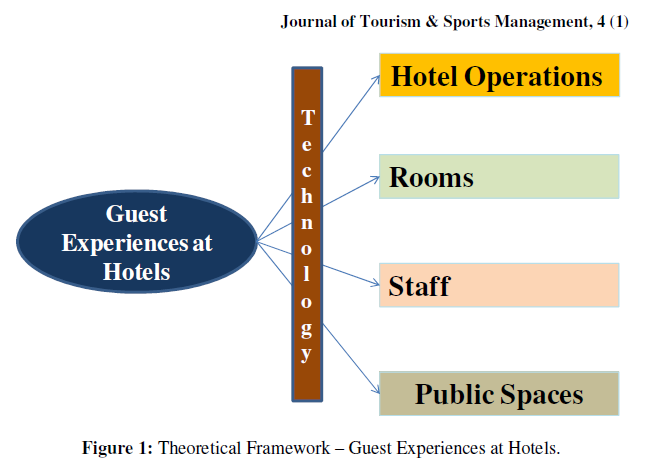

The views of (Ye et al.,2019). (Hall,2011). indicate that guest experiences are largely determined by hotel operations. How these operations must be interpreted in terms of the post-Covid situation and how technology will change hotel operations and routines needs to be determined. Guest experiences are also determined by the public spaces in hotels. These include lobbies, dining rooms and the external environment (Mouchtouri et al., 2019; Jones & Guan, 2011, Dressler & Paunovic, 2019). The quality of rooms at hotels and interactions with staff are the other two factors that also impact guest experiences (Cai et al., 2020; Hall, 2011; Paunovic&Jovanovic, 2019). This paper will evaluate how technology will impact the ability of the hotel to provide guests with memorable experiences with respect to these factors as well in the post-Covid environment.
METHODOLOGY
A mixed research approach was adopted using both qualitative and quantitative methods. The primary data collection tool was an online questionnaire containing close and open-ended questions. The questionnaire was administered to 30 experts in India who devise technological solutions for the tourism and hospitality sector to understand the technologies that hotels will have to implement to reassure guests in future. The objective will be to see what technologies are relevant for key hotel related activities such as booking rooms, guest relations, staff – guest interactions, making payments, dining etc. The data analysis can be used to make recommendations on what technologies hotels in India need to implement to reassure and attract more numbers of guests in the post - covid environment.
ANALYSIS
The responses with respect to hotel operations are indicated in (Figure 2).
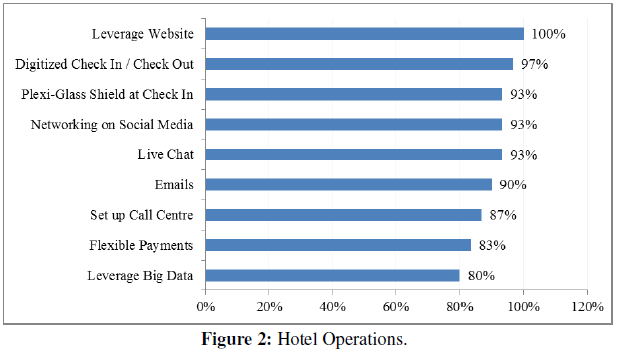

From Figure 2 it is observed that most respondents believe technology will particularly impact hotel operations that are related to attracting guests and facilitating their check – in and check – out activities. Most respondents pointed out that the hotel website is going to play a very important role in hotel operations in future. Several reasons were given for this. Respondent 3 stated that ‘During the current crisis period, it is very important to show on the website that the hotel is still ready to reopen post Covid and that reservations can still be made’. Respondents 10 and 23 mentioned that websites ‘must be leveraged to make every inquiry count and maximize converting guests into customers. This can be done by widgets on the hotel website that enable customers to compare room prices with those offered by Online Travel Agency (OTA) platforms /, pop-up windows that provide guests with personalized offers, promotions, incentives and discounts (Respondents 13, 28, 30). The booking process ‘must offer flexible terms and conditions to customers or inform customers that they can make an initial deposit that will be fully refundable in case of a cancellation’ (Respondent 18). This has the effect of reassuring the guests and also ensuring cash-flows to the hotel (Respondent 18).
Another important tool that is going to be very relevant to hotel operations post-Covid is the online chat-room. Respondent 22 stated that ‘Post Covid, it is going to take time for online traffic builds up. Therefore, it is necessary for hotels to be available to any inquires made on the website and to respond in real time’. Other benefits of online chatrooms include facilitating two-way conversations between hotel and potential guests in real time, greater personalization and ability to reassure guests about hygiene measures and precautions implemented (Respondents 10, 22, 25, 28). Other technologies mentioned by respondents include social-media and emails. Hotels can constantly broadcast through business pages on Facebook, Instagram and Twitter about their products, services and safety mechanisms being implemented. This has the effect of informing potential guests that the hotel is still operational and is keeping health and safety of guests in mind whenever it reopens. Emails not only enable customer queries to be answered but also allow hotels to market themselves to guests, showcase special offers, promotions and discounts. A fifth technological tool is to digitize payments mechanisms, making them more flexible and optimizing the entire transactional process. Respondent 8 mentioned the importance of ‘offering guests with multiple payment options including bank transfer, credit cards, PayPal, Google Pay, gift cards etc. which reduces the likelihood that guests will abandon their online shopping basket on hotel websites’.
In the post-Covid period, an underlying principle for all check in and check out processes is that they be made contactless / touchless as far as possible. This can be only done if they are technologically enabled. Respondent 24 mentioned about the growing relevance of mobile check-ins and digital key cards. Respondent 13 stated that ‘guests can be allowed to check in using a QR code that they scan into check in software’. Respondent 20 indicated that ‘guests should be able to check in remotely through their smartphones’. Most respondents indicated the need for hotels to develop ‘special smartphone apps, which they can download on their mobiles after making a booking. These apps can be used to access information on the hotel, to alert the hotels just before they arrive, to check in and to get to their rooms without making any surface contact’. (Table 1) gives the results of the regression tests where ‘guest experience’ was the dependent variable and the other variables in the table were the independent variables.
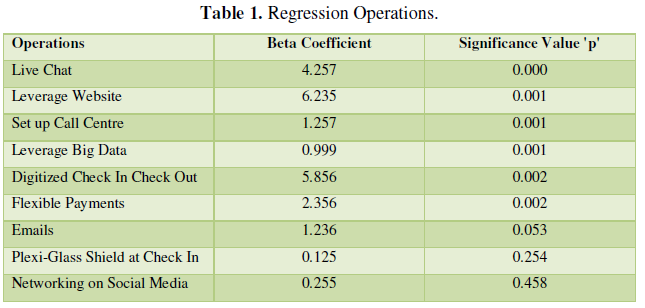

From the positive values of the beta coefficient in (Table1) it may be concluded that an increase in value for every variable will increase the quality of the guest experience. From the values of p<0.05, it may be concluded that live chat, websites, call centres, digitized check in / out and flexible payments are the most important factors that impact guest experiences during the period they decide on which hotel to book and at the time of check-in and check-out.
Figure 3 gives the respondent views on how technology is going to be impact hotel room operations in the post-Covid period. Rather than visit conference rooms or public areas in the hotel for work purposes, increasingly guests are doing to want to work out of their rooms. Hence, most respondents indicated that the rooms must be fitted out with Wi-Fi, internet and worktables / chairs for this purpose. Similarly, more numbers of guests are going to want to dine from their rooms rather than visit restaurants / bars. In this connection, respondent 8 stated the need for ‘voice-activated food ordering systems that must include wireless in-room / guest services. Respondents 18, 23 and 38 mentioned about ‘automated minibars as a way of maintaining safe social distancing whilst providing excellent customers service’.
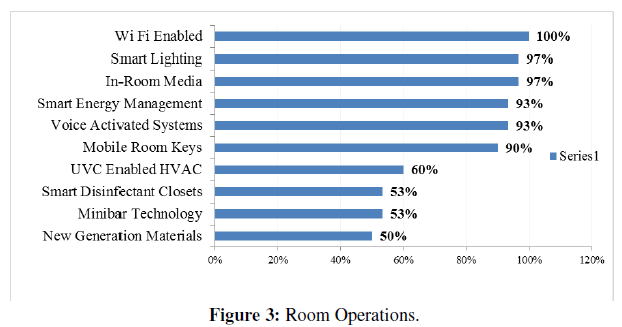

Customers could be offered online menu options that can be pre-booked by them. The meals are then stored in the minibar placed in the room. The minibar can also be stocked with beverages / cocktails of the guest choices and even items like electronic devices, toiletries, face masks etc. in accordance with guest requirements. ‘Self-service kiosks can also be placed within the hotel which provide guests with automated, contactless options to purchase items they want’ (Respondent 19).
It is important that room operations are conducted with minimal human contact. Here, respondent 2 stated the need for ‘voice activated elevator systems, in-room services and door opening / closing functionalities. It was recognized that air-conditioning or HAC systems in hotels need to be frequently sanitized. For this, respondent 19 stated the use of ‘Ultra-Violet (UV) systems in the AC’s that when turned on, perform the task of decontaminating AC, heating and ventilation systems. Other respondents stated that need to incorporate ‘new – generation materials such as anti-bacterial and microbe-resistant coverings for the walls, upholstery for sofas and chairs, fixtures and another room surfaces.
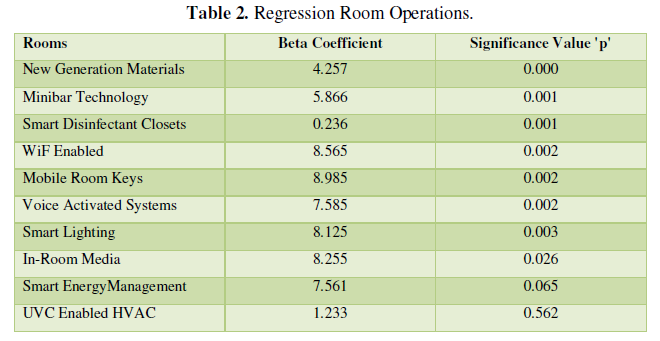

Table 2 gives the results of the regression tests where ‘guest experience’ was the dependent variable and the other variables in the table were the independent variables. From the positive values of the beta coefficient in (Table 2). it may be concluded that an increase in value for every variable related to room operations will increase the quality of the guest experience. From the values of p<0.05, it may be concluded that use of new generation materials, self-service options, wi-fi / internet compatible and smart lighting systems are some of the most important factors that are going to determine guests experiences in hotel rooms they occupy.
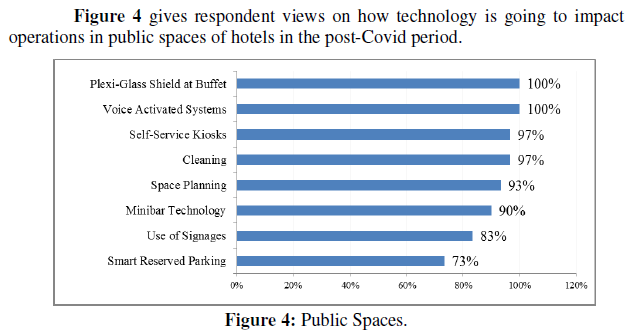

Most of the views on how technology can be leveraged to enhance safe use of public spaces match suggestions made for room operations. These include voice activated customer service systems, self-service kiosks and minibar technology. All the respondents were unanimous that servers / ushers in restaurants, bars and buffet services wear not just masks but face shields as well. This was to minimize risk of contamination as much as possible. Respondents 15, 26 and 30 stated the relevance of ‘prominently placed, brightly lit and readable signages throughout the hotel giving directions or notifications. This reduces the need for guests to raise queries with hotel staff’. Respondent 18 stated the relevance of ‘smart parking arrangements which will reduce dependence on valets. Hotels can use sensors and mobile apps that enable guests to reserve parking space before they arrive and to have their spaces automatically allocated to them upon arrival’. Table 3 gives the results of the regression tests where ‘guest experience’ was the dependent variable and the other variables in the table were the independent variables.
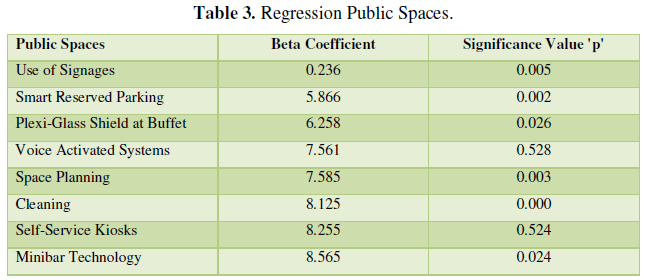

From the positive values of the beta coefficient in (Table 3) it may be concluded that an increase in value for every variable related to public spaces will increase the quality of the guest experience. From the values of p<0.05, it may be concluded that use of signages to guide guests, smart-parking facilities and safety measures at dining areas are some of the most important factors that are going to determine guests experiences with respect to public spaces in hotels. (Figure 5) gives respondent views on how technology is going to impact staff operations of hotels in the post-Covid period.
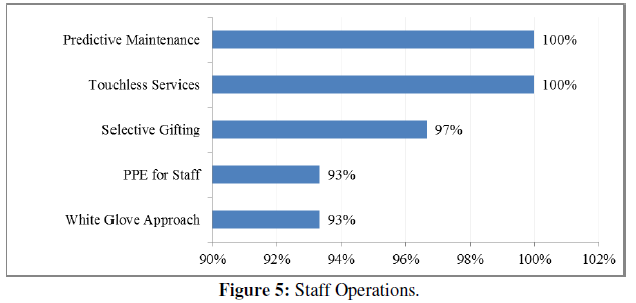

All the respondents agreed that the health and safety of hotel staff is as important as that of the guests. To ensure that staff operate in a safe manner it is necessary to minimize human – to – human contact as much as possible. One of the ways to do this is to implement predictive maintenance or PE systems. Respondent 28 explained these as being ‘sensor enabled systems that accumulate data on hotel operations and automatically analyses it to sound alerts whenever required about possible maintenance issues. In this way, staff do not need guests or their managers to complain about malfunctioning systems. The systems can be attended to based on PE generated alerts. Touchless services are another way of insulating and protecting staff. These include UV enabled HVAC systems that automatically decontaminate ventilation spaces, lighting and energy sensors that adjust room operations in line with guest preferences. Other suggestions include implementing employee service protocols such as providing gloves to staff that are required to greet guests on arrival and handle their luggage. Staff should be trained in adopting a selective gifting approach to sensitize guests as well. For example, instead of providing guests with gifts like chocolates or fruit hampers, they can be instead given branded face masks or hand-sanitizers.
DISCUSSION
Based on the analysis in section 3 and on the theoretical model in (Figure 1) the conceptual model in (Figure 6) was developed.
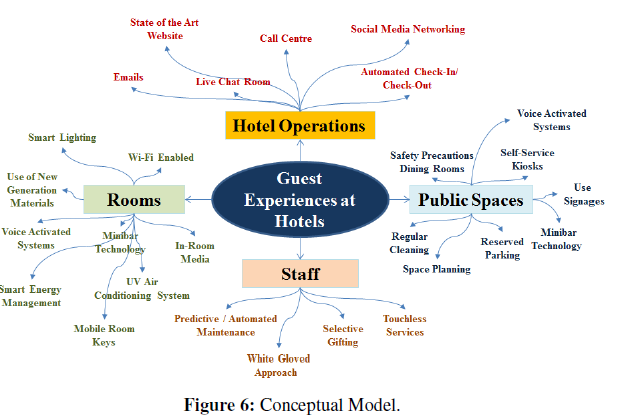

Figure 6 demonstrates how the key constructs that are related to guest experiences at hotels must be reinterpreted using technology in the post-Covid scenario. From the literature review in section 2, it was identified that guests’ experiences are mainly impacted by hotel and room operations, interactions with staff and public spaces. Going forward, technology will become an important determinant of guests experiences with respect to those hotel operations related to check in and check out, making inquiries and guest relations. Technology will determine room-stay experiences with more guests preferring to work out of their rooms, placing orders using automated systems, preferring touchless door open / close systems as well as systems for switching lights / heating / cooling systems and automated methods of cleaning / disinfecting the room. With respect to public spaces, technology will determine safe use of dining rooms, space planning, cleanliness, access to services such as parking and navigating through the hotel. Technology will moderate staff activities related to maintenance, their ability to offer services without compromising quality and activities such as meeting/greeting guests.
CONCLUSION & RECOMMENDATIONS
The main research question was to identify how technology can be used to craft positive experiences for hotel guests in India in the post-Covid period. The broad conclusion that can be made is the technology will be particularly relevant with respect to hotel operations, room and public experiences and interactions with staff. The following recommendations are made to show how technology can be leveraged in each of these areas.
Hotels must adopt the broad principle that for enhancing perceptions related to safety, as far as possible hotel operations and guest interactions must be made touchless / contactless. At the same time, there must be no compromise in quality of services provided to guest. It is this principle that must underlie any technologies that hotels implement in future.
The hotel website must play a key role in not informing guests about hotel services and enabling them to make hotel bookings. It must be made attractive and interactive, persuading guests about the safety precautions adopted by the hotels and coerce them to make a booking. This can be done through interactive widgets, banners and podcasts that are as informative as they are interactive. The live chat room will play a most important role in answering customer queries in real time as well as in showcasing the facilities / safety precautions in the hotel. The website must be linked with social media such as Twitter, Facebook and Instagram so that even casual browsers on these media can seamlessly connect with the website and get access to more information and services.
Hotel operations related to check in and check out must be completely automated. This can be enabled on the website itself or through special smartphone applications. The hotels must provide guests with mobile keys in the form of QR codes at the time of confirming bookings that can be used to open / close doors and to gain access to public areas and other facilities in the hotel.
The telephone and telephone enabled services in the form of a dedicated call centre will emerge as an important, if conventional technology enabled service. Guests are going to want their queries to be answered in real time. These technologies can be leveraged to not only answer queries, but to showcase the hotel and convert casual inquiries into bookings.
More number of guests are going to want to work from their rooms. Wi-Fi and video-conferencing equipment (wherever asked for) and internet enabled services must therefore be incorporated into room design. The whole process of placing orders must be automated through electronic voice activated systems. The use of minibars must be encouraged for guests to avail of services such as in-room dining and access to items like face-masks, soaps and anything else that they may require.
Cleaning and maintenance services related to Air Conditioning, disinfecting the rooms as well as smart energy and smart lighting services must be automated using modern technologies such as sensors and ultra-violet ray activated mechanisms. Room design must feature specially crafted, germ-resistant materials that increase the perception that the room is safe to stay in.
Technology has an important role to play with respect to creating perceptions among guests that public spaces such as lobbies and restaurants are clean and safe. Technologies need not be complex. A simple face mask with shield worn by serving staff will suffice to enhance safety perceptions among guests. Here again, voice automated systems, kiosks and minibars will ensure self-service as much as possible and minimize person-to-person contact.
Hotels will need to develop dedicated smartphone applications that can permit a host of functionalities. These apps can be used to not just make bookings, but payments as well. Guests should be able to check in and out, place food / beverage orders, give feedback, make complaints and even avail of special services such as reserving parking space and gaining access to such spaces upon check – in.
It is important for the hotel to put in place sensor – activated, predictive maintenance systems. These systems will eliminate or reduce the need for customers to complain about malfunctioning facilities and derisk staff from possible infection as well. Hotel staff will be able to proactively get them repaired preferably before guests arrive so that there is very little contact with the guests themselves. The principle here is that staff must be permitted to interact with guests and serve them properly with minimum contact, in a safe manner. Providing staff with masks, gloves and with automated processes of taking orders and of delivering them are some of the technologies enabled methods for staff to be able to deliver safe services in future.
- Cai, G., Wang, J., Xu, L., & Gao, W. (2020). Observations of Chinese City Architecture Biennale Driven by Economy. Journal of Asian Institutional Low Carbon Density 1, 71-76.
- Dressler, M., & Paunovic, I. (2019). An exploration of digital innovation activity of German wineries in the regionaltourism context Differentiation and complementarity. In Proceedings of the 1st International Research Workshop on Wine Tourism Challenges and Futures Perspectives Strasbourg France 27-28.
- Economic Times. (2020). Indias Tourism Sector May lose Rs 5 lakcr, 4-5 cr jobs could be cut due to Covid-19. Published by Economic Times.
- Hall, M.C. (2010). Crisis events in tourism Subjects of crisis in tourism. Current Issues in Tourism 13, 401-417.
- Han, H., Lee, S., & Hyun, S.S. (2019) Role of Internal and External Museum Environment in Increasing Visitors Cognitive Active Healthy Experiences and Loyalty. International Journal of Environment and Public Health 16, 4537.
- Hyun, S.S., & Perdue, R.R. (2017). Understanding the dimensions of customer relationships in the hotel and restaurant industries. International Journal of Hospitality Management 64, 73-84.
- Jones, D.L., &Guan, J.J. (2011). Bed and Breakfast Lodging Development in Mainland China: Who is the Potential Customer. Asia Pacific Journal of Tourism 16, 517-536.
- Mouchtouri, V., Christoforidou, E.P., & Der Heiden, A. (2019). Exit and Entry Screening Practices for Infectious Diseases among Travelers at Points of Entry. International Journal of Environmental Public Health 16, 4638.
- Paunovic, I., & Jovanovic, V. (2019) Sustainable mountain tourism in word and deed: A comparative analysis in the macro regions of the Alps and the Dinarides. Acta Geogr Slovenia.
- PTI (2020) Coronavirus Impact Indian tourism could run into thousands of crores of rupees loss. Published by The Week.
- Ye, S., Xiao, H., & Lingqiang, Z. (2019). Small accommodation business growth in rural areas: International Journal of Hospitality Management 76, 29-38.








